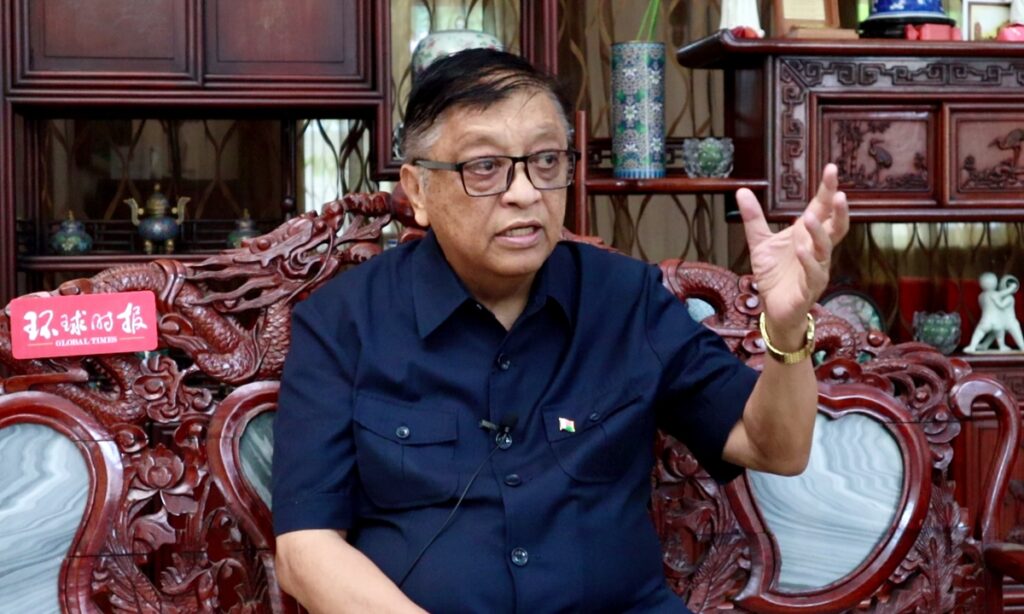As one of the earliest African countries to sign an agreement on the Belt and Road Initiative, Madagascar has achieved notable results in forming a closer economic partnership with China. In an exclusive interview with the Global Times, the Ambassador of Madagascar to China Jean Louis Robinson shares his understanding regarding the Belt and Road Initiative, refuting the Western media’s narrative over the so-called Chinese “debt trap”. He said BRI is win-win proposition, different from the Western obsession with conspiracy theories.
GT: What kind of cooperation has China and Madagascar achieved under the Belt and Road Initiative (BRI) in recent years?
Robinson: Madagascar was one of the first African countries to sign the BRI with China. In my opinion, BRI has brought enormous influence to countries along the route since it was proposed 10 years ago. As ambassador, the Chinese government has invited me to many provinces to see the achievements linked to the BRI. I have also witnessed many countries benefiting from the initiative, and have accessed many development opportunities to boost their own domestic economies.
Madagascar is an island country in the Indian Ocean, but whether it is in the Mozambique Strait or on the east coast of Madagascar, it is rich in oil or natural gas resources. Madagascar has abundant offshore oil resources, combined with a strategic location, meaning there is great potential for cooperation with China in oil refining and port development. In particular, the port can connect goods from southern Africa, in addition to cement plants and aluminum mines.
When China advances the BRI, please don’t forget Madagascar. I sincerely hope that the projects in the BRI can be implemented in Madagascar as soon as possible.
When referring to Madagascar, please don’t say that Madagascar is very poor. In fact, Madagascar is not poor at all. On the contrary, it is very rich, and its natural resources are abundant. I believe Madagascar will do very well one day.
GT: How does the BRI connect with the “Madagascar Revitalization Initiative”?
Robinson: Madagascar’s revitalization initiative is a great revitalization plan, with some specific projects proposed by our President. Combined with the BRI, it will not only help the development of Madagascar but also assist with China’s development.
Currently, about 80 percent of Madagascar’s revitalization plan has been realized, with 20 percent left to complete. If these remaining projects could be combined with the BRI, Madagascar will be able to lift itself out of poverty.
The BRI is a mutually beneficial and win-win initiative. Of course, we also hope that there will be no “unstable factors” in Madagascar, because once there are unstable factors, there will be no development at all.
GT: How do you view the so-called Chinese “debt trap” theory hyped by the West?
Robinson: There is no trap in the BRI. On the contrary, for some developing countries, especially some emerging market economies, the BRI is a very good opportunity.
For China, my deepest impression is the coherence of policies. China has its own development planning, and then it develops in a thought out manner, which some countries do not have. This coherence has also brought great opportunities for China’s development. The BRI is a win-win proposition, which is very different from the West who always talk about conspiracy theories.
For our developing countries, we can gain something from the BRI, so what have Western countries done for us? You have never proposed this kind of win-win partnership.
The reason why Western countries push this so-called “debt trap” theory is in an attempt to hinder the development of African emerging economies. You see, our country is rich in resources but our people still have low incomes. Where can there be any conspiracy? I am clearly opposed to this view.
GT: Could you please talk about how Chinese agricultural experts planting hybrid rice and the 5A national highway reconstruction project have benefitted local people? What role have they played in local economic development and job creation? Is there any room for further cooperation?
Robinson: With regard to hybrid rice, we are mainly cooperating with Yuanshi Seeds Industry Hi-Tech Co at present. Although there are some differences at present, it is still developing in a positive direction. After the presidential election, it will be possible to continue to advance these projects. In addition, the two countries have future opportunities to work together on rail and port projects. Hospitals and universities are also important areas of cooperation.
GT: A Madagascar official said that the country looks forward to learning from China’s development experience. In your opinion, what are the highlights of cooperation between the two countries? There may be misunderstandings and setbacks caused by cultural differences and other reasons. How can the two countries overcome all this?
Robinson: There is no cultural misunderstanding of any kind. The reason why some projects are progressing slowly is that there is no agreement on the specific terms of the contract. But I believe that these problems will be resolved in the future.
GT: We learned that StarTimes provides some satellite TV services in your country, and many local people can watch Chinese TV dramas with local dialects. What do you think of this kind of cultural exchange? What other cultural exchange projects do you think the two countries can carry out in the future?
Robinson: The two countries can have some exchanges in sports, such as football and Kung Fu. In terms of sports, there can be exchanges and training for athletes, including some young people who can start training from an early age.
Our people are obsessed with learning about Chinese culture. China’s ceramic art, silk and carvings are also welcomed in our country.
In addition, China is promoting its Luban Workshop in Madagascar. The workshop has cultivated a group of unique and special skills in our country, and it can also set up related majors in some universities, not only in the capital, but also in other major provinces, and in urban areas.
(Global Times)




